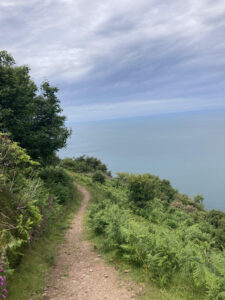Walking in nature helped Robyn O’Mahony, NOW’s Communications Officer, to tackle her anxiety. Here, for Mental Health Awareness Week, she writes about how walking works for her.
____________________________________________________________________________________________
I’ve always been an anxious person. It started when I was very young in small, subtle ways, before becoming an always-present, dominant force in my life.
At 18, I struggled to leave the house without panic accompanying me, and now, at 28, I experience anxiety every day about many different things. This, I now know, is Generalised Anxiety Disorder.
Throughout the years I’ve had lots of therapy and tried my hand at everything from mindful colouring, knitting, yoga, and macrame, to cross-stitching, running, and meditation. But the three things that help me the most?
- Talking to friends and family about the things that make me anxious;
- Walking in nature;
- Keeping a journal.
When I read that anxiety is the focus of this year’s Mental Health Awareness Week, I wasn’t surprised. The last few years have been hugely challenging for all of us, and I know lots of people who had no history of anxiety now find themselves struggling with it.
I find my anxiety becomes overwhelming when I experience an influx of information. For me, this means limiting the news I watch and read, the social media I interact with, and the time I spend on my phone. When I feel anxious, I know I need to move my body to counteract the negative energy that manifests in symptoms of panic.
It might sound simple to say go for a walk. But if you are anxious today, or any day, I urge you to take one. Not a walk with your earbuds in or your phone active, but one where you can observe what’s going on around you; listen to the birds, take note of the trees, examine the sky. This isn’t to say one walk will eradicate the anxiety you might be experiencing, but to suggest that removing yourself from a space of anxiety and becoming active in an outdoor environment will – scientifically at least – have some kind of positive impact. As suggested by research referenced by mental health charity, Step One, walking is proven to help lessen symptoms of anxiety and depression. The best thing? It’s free.
For me, walking offers me an opportunity to gain perspective. When I’m very anxious, it’s difficult for me to order my thoughts and think logically. When I’m moving my body and focusing on what’s around me in an outdoor environment, I’m better able to regain control. In this way, walking is my therapy. I see familiar faces, I notice the subtle changes of the area I walk in each time I’m there, and I am reminded that I am one person in a global community of many. This comforts me.
It’s not just about confronting anxiety. Walking has been there for me in moments of loneliness as, even when I’m walking alone, I’m surrounded by other walkers, runners, dogs, and birds. NHS Inform point to the impact of walking on various elements of our health and, as an avid walker, it comes as no surprise.
Give walking a go this week and see where it takes you.

